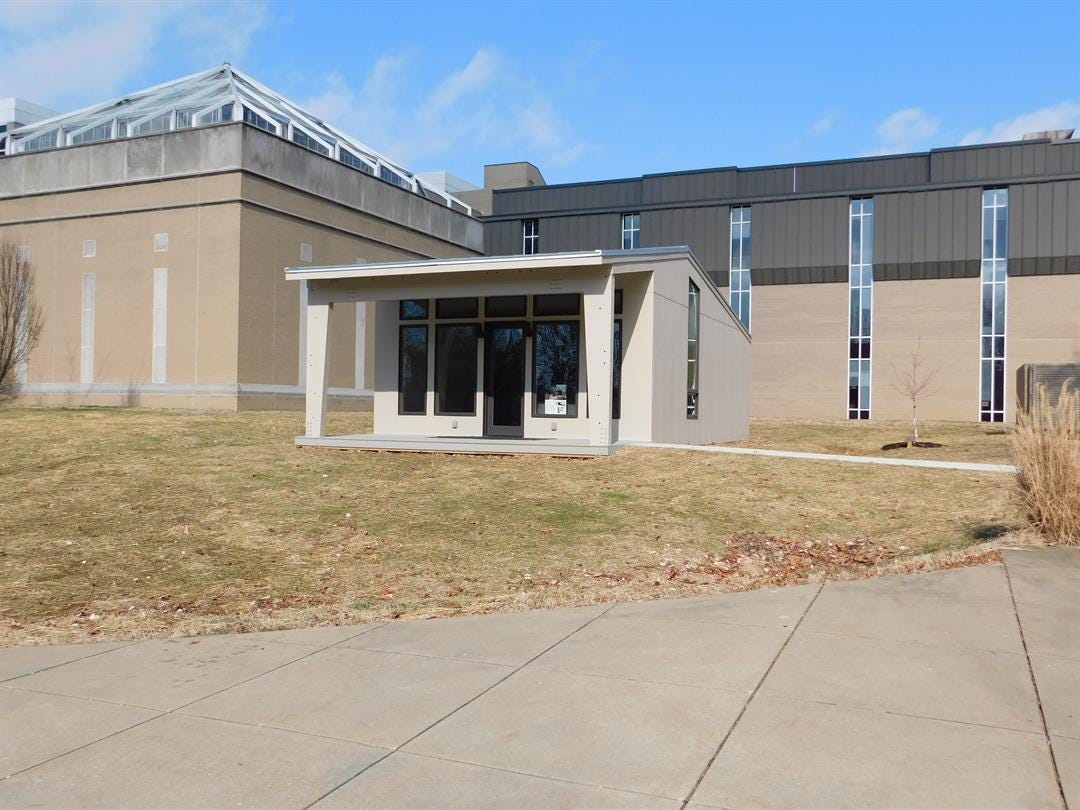USI Tiny House To Develop ‘Aging in Place’ Technology
 The single Minka house could possibly lead to a community of tiny houses near USI. (Courtesy: USI Center for Healthy Aging and Wellness)
The single Minka house could possibly lead to a community of tiny houses near USI. (Courtesy: USI Center for Healthy Aging and Wellness)
Subscriber Benefit
As a subscriber you can listen to articles at work, in the car, or while you work out. Subscribe NowA new “tiny” house on University of Southern Indiana’s campus is addressing some big issues associated with aging. Could elders live independently—and with better quality of life—in a compact house equipped with smart home technology? Could college students live alongside elders in communities of tiny houses, benefitting both young and old? USI researchers want to turn the perception of growing old on its head, unlocking new strategies to help seniors “age in place.”
Blink and you’ll miss the 600 square foot home on USI’s Evansville campus, spearheaded by nationally-renowned aging expert and geriatrician Dr. Bill Thomas, who the Wall Street Journal named among the “Top 10 Innovators” changing the future of retirement in America. While nobody currently lives in the “Minka” house—derived from a Japanese word that means “house of the people”—it’s home to several research projects to uncover new concepts on how seniors could do just that: live like they never have before.
“What would elders need in a home like the Minka,” says USI College of Nursing and Health Professions Dean Dr. Ann White, “that would allow them to remain as independent as possible within the home, yet have a safe environment and high quality of life?”
More than 20 percent of the U.S. total population will be over the age of 65 by 2029, reports the U.S. Census Bureau. Yet 98 percent of housing in the U.S. isn’t suitable for growing old, says Thomas, putting a massive burden on nursing homes and assisted living facilities.
One of the first research projects at the Minka is underway, studying how smart home technology, artificial intelligence (AI) and robotics could help seniors live independently longer. The tiny house is equipped with an Alexa device, so students and faculty can learn to adapt such connected devices to help seniors in particular.
“Can Alexa monitor if they left the stove on? If they can’t run the remote, can we control the TV with Alexa? Can we control the heating environment?” says White. “We’re seeing how we can use those types of technology to have a check and balance system and safety net for them and their family.”
The Minka project has also built a “robot”—basically, a monitor on wheels—that can be controlled remotely to move throughout the house.
“So the daughter in Colorado, for example, can operate the robot, so [family members] can see ‘Is Mom doing the dishes? Is she having a hard time keeping the house up?’ They can wheel around the house and check out things,” says White. “And [with the monitor], they can have a face-to-face conversation instead of just on the phone.”
The robot, or another connected device, could also enable telehealth, so elders could “see” their doctor without leaving home. Automated “smart carts” are dispensing medication in hospitals; White says perhaps a similar technology could help a senior living in a Minka. Much of technology exists, notes White, “it’s just a matter of how we bring it all together, and how we use it in this environment.”
“We need to identify ways elders can be as independent for as long as possible for their own quality of life, but we also need to understand the financial burden on [the healthcare system],” says White. “If we can keep people in their home, we are more efficient with those costs, more effective with supporting them and their quality of life, and there’s greater satisfaction from family members who are maybe living at a distance, but know their mom or dad has this safety net.”
To help determine other areas of focus for the Minka house, a second study is researching students’ perceptions about aging; with data from 1,500 students, White believes it’s the largest study of its kind.
The university believes the Minka house has the power to not only change students’ views about growing old, but help update society’s perception as well.
Dr. White also appeared on Inside Indiana Business Television to discuss the Minka house with Business of Health Reporter Kylie Veleta.
White says the Minka project leverages USI’s strengths in applied research.
White says the study focusing on students’ perceptions about aging will help shape coursework in several different academic disciplines.
